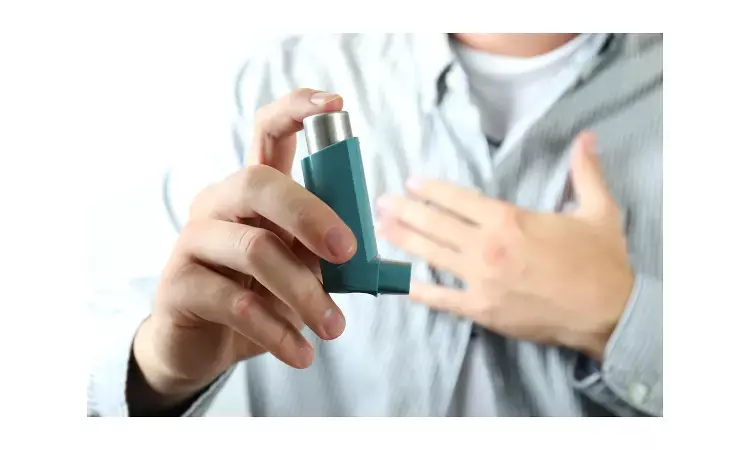- Home
- Medical news & Guidelines
- Anesthesiology
- Cardiology and CTVS
- Critical Care
- Dentistry
- Dermatology
- Diabetes and Endocrinology
- ENT
- Gastroenterology
- Medicine
- Nephrology
- Neurology
- Obstretics-Gynaecology
- Oncology
- Ophthalmology
- Orthopaedics
- Pediatrics-Neonatology
- Psychiatry
- Pulmonology
- Radiology
- Surgery
- Urology
- Laboratory Medicine
- Diet
- Nursing
- Paramedical
- Physiotherapy
- Health news
- Fact Check
- Bone Health Fact Check
- Brain Health Fact Check
- Cancer Related Fact Check
- Child Care Fact Check
- Dental and oral health fact check
- Diabetes and metabolic health fact check
- Diet and Nutrition Fact Check
- Eye and ENT Care Fact Check
- Fitness fact check
- Gut health fact check
- Heart health fact check
- Kidney health fact check
- Medical education fact check
- Men's health fact check
- Respiratory fact check
- Skin and hair care fact check
- Vaccine and Immunization fact check
- Women's health fact check
- AYUSH
- State News
- Andaman and Nicobar Islands
- Andhra Pradesh
- Arunachal Pradesh
- Assam
- Bihar
- Chandigarh
- Chattisgarh
- Dadra and Nagar Haveli
- Daman and Diu
- Delhi
- Goa
- Gujarat
- Haryana
- Himachal Pradesh
- Jammu & Kashmir
- Jharkhand
- Karnataka
- Kerala
- Ladakh
- Lakshadweep
- Madhya Pradesh
- Maharashtra
- Manipur
- Meghalaya
- Mizoram
- Nagaland
- Odisha
- Puducherry
- Punjab
- Rajasthan
- Sikkim
- Tamil Nadu
- Telangana
- Tripura
- Uttar Pradesh
- Uttrakhand
- West Bengal
- Medical Education
- Industry
Portable spirometry promising for home monitoring of asthmain young adults

Self-monitoring asthma control is a key component of asthma management. A recent study in the Journal of Asthma has reported usability and acceptability of portable spirometry among young adults with asthma being effective and portable spirometry offers a practical solution to monitoring airway narrowing at home.
Asthma is a major noncommunicable disease (NCD), affecting both children and adults, and is the most common chronic disease among children. Asthma affected an estimated 262 million people in 2019 and caused 455 000 deaths. Inhaled medication can control asthma symptoms and allow people with asthma to lead a normal, active life.
Ross Bindler and team aimed to determine if self-administered spirometry is feasible and acceptable in young adults with asthma and whether regular monitoring resulted in improved airway function as measured by forced expiratory volume in one second (FEV1).
A total of 67 young adults (18-26 years) with self-reported asthma participated in a clinical trial during wildfire season which measured FEV1 as an outcome measure. Data was collected at baseline, week 4, and week 8 using a portable spirometer linked to a smartphone application. A subset of intervention participants completed spirometry twice daily. Acceptability of self-administered spirometry was evaluated after the trial among participants that volunteered to submit a survey and be interviewed.
The key findings of the study are
•All 67 participants completed their scheduled spirometry readings which declined to 94.0% (n = 63) at week 4 and 86.6% (n = 58) at week 8.
•Daily readings were completed 83.2% of the time in the mornings and 84.3% of the time in the evenings.
•Mean FEV1 values were lower than predicted values, but above the lower limit of expected. FEV1 remained steady throughout the study period.
Over two-thirds of participants used the notes feature in the application and described symptoms, asthma triggers, mitigating actions and test-taking issues.
Researchers concluded that young adults in our sample were highly compliant with regular, self-administered spirometry.
Reference: Ross Bindler, Hans C. Haverkamp, Hannah O'Flanagan, Justin Whicker, Ana G. Rappold, Von Walden & Julie Postma (2022) Feasibility and acceptability of home monitoring with portable spirometry in young adults with asthma, Journal of Asthma, DOI: 10.1080/02770903.2022.2160345.
MSc. Neuroscience
Niveditha Subramani a MSc. Neuroscience (Faculty of Medicine) graduate from University of Madras, Chennai. Ambitious in Neuro research having worked in motor diseases and neuron apoptosis is interested in more of new upcoming research and their advancement in field of medicine. She has an engrossed skill towards writing and her roles at Medical dialogue include Sr. Content writer. Her news covers new discoveries and updates in field of medicine. She can be reached at editorial@medicaldialogues.in
Dr Kamal Kant Kohli-MBBS, DTCD- a chest specialist with more than 30 years of practice and a flair for writing clinical articles, Dr Kamal Kant Kohli joined Medical Dialogues as a Chief Editor of Medical News. Besides writing articles, as an editor, he proofreads and verifies all the medical content published on Medical Dialogues including those coming from journals, studies,medical conferences,guidelines etc. Email: drkohli@medicaldialogues.in. Contact no. 011-43720751


